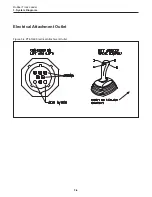
Rubber Track Loader
1. Product Safety
1-3
Repair
! WARNING !
Accidental machine starting can cause injury or death
to personnel working on the machine.
To avoid accidental machine starting, disconnect the
battery cables from the battery and tape the battery
clamps and remove the key.
Place a “Do Not Operate” tag prominently on the ma-
chine to inform personnel that the machine is being
worked on.
1.
Disconnect battery and discharge any capacitor
before starting to work on the product. Attach a
Do Not Operate
tag in the Operator's Compart-
ment.
2.
If possible, make all repairs with the machine
parked on a level, hard surface. Block the ma-
chine to prevent it from rolling while working on
or under the machine.
3.
Do not work on any machine that is supported
only by lift jacks or a hoist. Always use blocks or
jack stands to support the machine before per-
forming any service or disassembly.
4.
Make sure the work area around the product is
made safe and be aware of hazardous condi-
tions that may exist. If an engine is started inside
an enclosure, make sure that the engine’s ex-
haust is properly vented.
5.
Be sure all protective devices including guards
and shields are properly installed and function-
ing correctly before starting a repair. If a guard
or shield must be removed to perform the repair
work, use extra caution.
6.
Always use tools that are in good condition and
be sure you understand how to use them before
performing any service work.
7.
Replace all fasteners with the same part num-
ber. Do not use a lesser quality fastener if re-
placements are necessary.
8.
Be prepared to stop an engine if it has been re-
cently overhauled or the fuel system has been
recently worked on. If the engine has not been
assembled correctly, or if the fuel settings are
not correct, the engine can possibly overspeed
and cause bodily injury, death or property dam-
age. Be prepared to shut off the fuel and air
supply to the engine in order to stop the engine.
9.
Be careful when removing cover plates. Gradu-
ally back off the last two bolts or nuts located at
opposite ends of the cover or device. Then, pry
the cover loose to relieve any spring or other
pressure before removing the last two nuts or
bolts completely.
10.
Repairs requiring welding should be performed
only with the benefit of the appropriate reference
information and by personnel adequately trained
and knowledgeable in welding procedures. De-
termine the type of metal being welded and se-
lect the correct welding procedures and
electrodes, rods or wire to provide a weld metal
equivalent at least to that of the parent weld.
11.
Do not damage wiring during removal opera-
tions. Reinstall the wiring so it is not damaged
during installation or operation by contacting
sharp corners or by rubbing against some object
or hot surface.
12.
Always use lift arm supports to keep lift arms
raised. Keep the attachment tilted down and as-
sure that all hydraulic pressure has been re-
lieved for maintenance or repair work that
requires the lift arms to be in the raised position.
13.
Tighten connections to the correct torque. Make
sure that all heat shields, clamps and guards are
installed correctly to avoid excessive heat, vibra-
tion or rubbing against other parts during opera-
tion. Shields that protect against oil spray onto
hot exhaust components in event of a line, tube
or seal failure must be installed correctly.
14.
Do not operate a machine if any rotating part is
damaged or contacts another part during opera-
tion. Any high-speed rotating component that
has been damaged or altered should be
checked for balance before reusing. Make sure
all protective devices, including guards and
shields, are properly installed and functioning
correctly before starting the engine or operating
the machine.
Attachments
Only use attachments that are recommended by the
manufacturer of the machine.
Make sure that all necessary guarding is in place on
the host machine and on the attachment.
Wear protective glasses and protective equipment
as required by conditions or as recommended in the
attachment’s operation manual.























